How AI Will Revolutionize The Future Of SEO
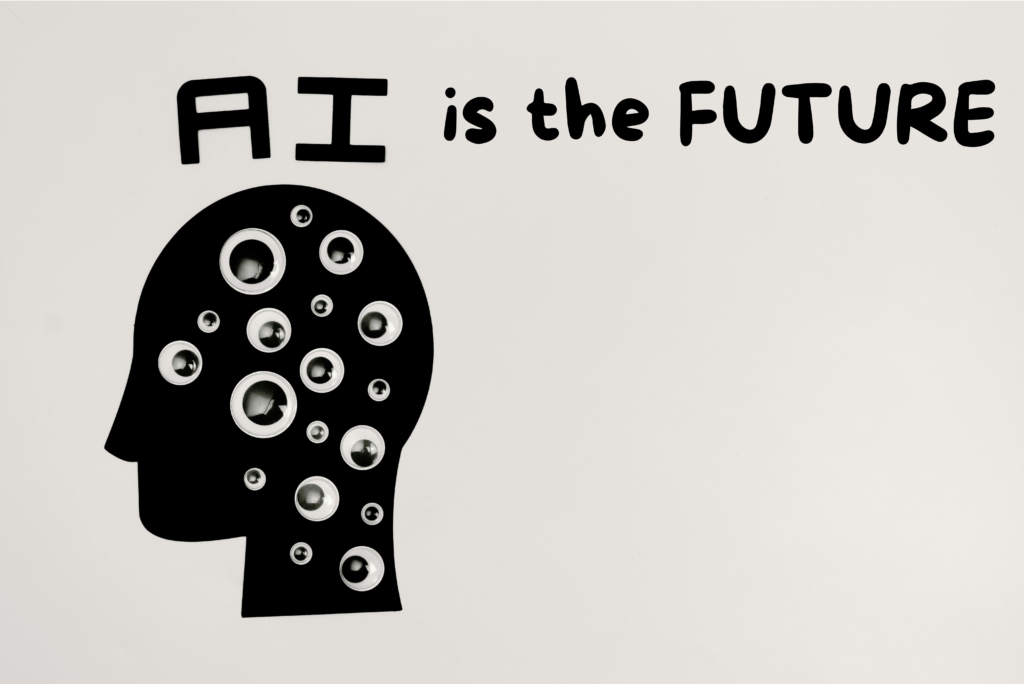
In recent years, the rise of artificial intelligence (AI) has altered how we interact with technology. How AI is impacting SEO is a question that many marketers are pondering. Exploring how AI is impacting SEO can provide valuable insights into the future of search engine optimization strategies.
From chatbots to personal assistants, artificial intelligence is becoming an increasingly important part of our lives. As AI technology advances, it can potentially transform the world of SEO by changing how search engines operate and how businesses optimize their online presence.
Understanding how AI is impacting SEO is crucial for staying ahead in digital marketing. While the use of Artificial Intelligence has proven beneficial in various industries, it raises the question remains:
Will AI be a boon or a curse for SEO experts?
In this article, we’ll look at the significant impact of AI on SEO from a different angle and try to answer these questions.
The Rise of AI In SEO
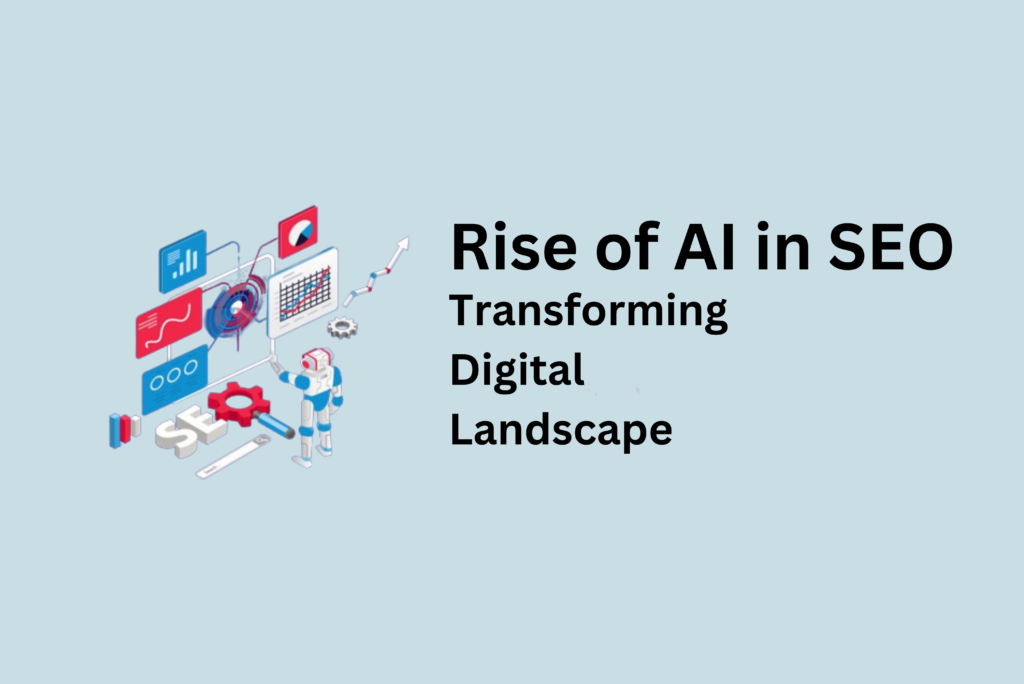
Artificial intelligence is not a new concept in SEO.
For years, search engines like Google have been employing AI algorithms to rank and display web pages based on their relevance and quality.
Related: SEO & Reputation Management: An In-Depth Guide
Here are nine ways Google uses AI:
Search Results: When Google was founded, most searches took place on computers in homes, computer labs, and libraries. Twenty-five years later, AI’s multisearch feature allows for searches in new languages, with new inputs (such as using your camera or even voice search), and with multiple inputs at the same time.
Maps: Google Maps’ AI analyzes data to provide up-to-date information about traffic conditions and delays, sometimes allowing you to avoid getting stuck entirely. Additionally, it automatically updates business hours and speed limits.
Related: Ways To Drive Traffic To Your Website: 3O Proven Ways
Pixel: AI enables your Pixel phone to instantly translate between 21 languages in chat and facilitates a verbal conversation between 6 languages in Interpreter Mode.
Photos: Google Photos uses artificial intelligence to help you search for photos based on what’s in them. More recently, we’ve used AI in Photos to help you relive forgotten “Memories.”
Assistant: For a while, humans communicated naturally, but computers struggled. However, with Natural Language Processing (NLP) AI, Assistant can now understand and respond in a human-like manner, interpreting the meaning of your questions accurately.
These are just a few of the numerous advancements implemented by Google with AI. These advancements present both opportunities and challenges for SEO experts, who must adjust to the evolving search environment and user behavior. To optimize their websites effectively and deliver optimal user experience and value, SEO experts must harness AI tools and methodologies tailored to the new search paradigms.
AI as a Boon for SEO Experts
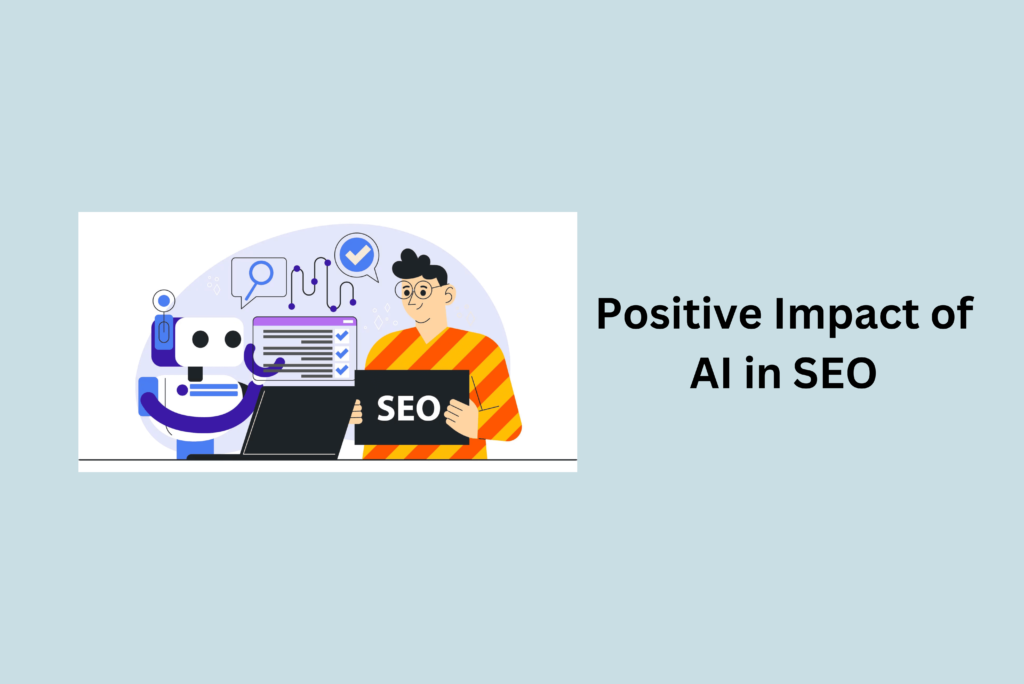
AI can help SEO experts improve their SEO performance and efficiency in a variety of ways. Here are some of the advantages of AI for Search Engine Optimization:
1. Enhanced Keyword Research
Keyword research stands out as a vital yet time-consuming aspect of SEO, involving the identification and analysis of user-searched terms and phrases online for information, products, or services.
Related: 7 Reasons Why Keyword Research Is Important For Your Coaching Business
AI-powered tools can help SEO professionals conduct keyword research more quickly and intelligently by providing them with relevant and accurate data such as search volume, competition, difficulty, and trends.
For instance, long-tail keywords are more targeted and less competitive, resulting in more qualified organic traffic and website conversion rates. AI can help you find such keywords.
For example, tools like SEMrush and Moz use AI to deliver thorough and insightful keyword research data and recommendations.
2. Optimized Content Creation
Content is the king of SEO because it determines a website’s relevance and quality, as well as its ranking and visibility in search engines.

Related: 13 Best AI Writing Tools for Content Writing
Leveraging AI can offer advice and feedback on many aspects of creating content, including topic selection, headline generation, readability, tone, sentiment, grammar, and plagiarism. It can also optimize content for natural language and voice search optimization by using natural language generation resulting in better engagement and effective content marketing.
3. Improved On-Page SEO Performance
On-page SEO is the optimization of a web page’s elements and attributes, such as title tags, meta descriptions, headings, images, links, and schema markup, that influence its ranking and visibility on search queries.
AI can help SEO professionals improve their on-page SEO by making recommendations and best practices for optimizing their web pages for search engines and users.
Apart from suggestions and recommendations, AI can automate and streamline some of the time-consuming and repetitive tasks of on-page SEO, such as creating and updating meta tags, resizing and compressing images, and adding and fixing links.
Related: Is SEO Worth It For Small Businesses: Proven SEO Tips
For example, Yoast and Rank Math use artificial intelligence to assist SEO professionals in improving their on-page SEO.
Marketers need to grasp how AI is impacting SEO to optimize their strategies. AI can also assist SEO professionals with SEO strategies, such as off-page SEO, technical SEO, local SEO, and mobile SEO, by providing data, insights, and solutions to optimize their websites for various platforms, devices, and locations.
4. AI Creates Powerful Reporting and Analytics
The future of digital marketing lies in understanding how AI is impacting SEO. Artificial intelligence reveals the true capabilities of real-time analytics in digital marketing. The advanced analytics solution powered by AI includes infrastructure, reporting paradigms, and a variety of technologies. Exploring how AI is impacting SEO can reveal new opportunities for website optimization.
There are also AI-powered SEO techniques that allow marketers to group objects in a similar section so that they can check their website and landing pages and group them more effectively. Search engines consider these classified contents to be more powerful, so they will rank higher.
5. Use of AI and Machine Learning (ML) will Mould Digital Marketing
Artificial intelligence has the potential to significantly enhance digital marketing efforts. Mastering how AI is impacting SEO requires staying updated on the latest developments.
AI also uses Machine Learning to simplify the complex SEO process, allowing marketers to focus on semantic searching, consumer behavior, lead generation, and content curation and development. AI is reshaping the digital marketing space by enabling:
- Predicting social media and consumer purchasing behavior using robust analytics and reporting.
- Use AMP to reduce load time, increasing the likelihood of ranking on the first page of Google.
- Chatbots and prompt notifications provide a personalized user experience.
- Linking sub-contents to the main pillar content improves performance and rankings.
The Potential Downsides of AI on SEO
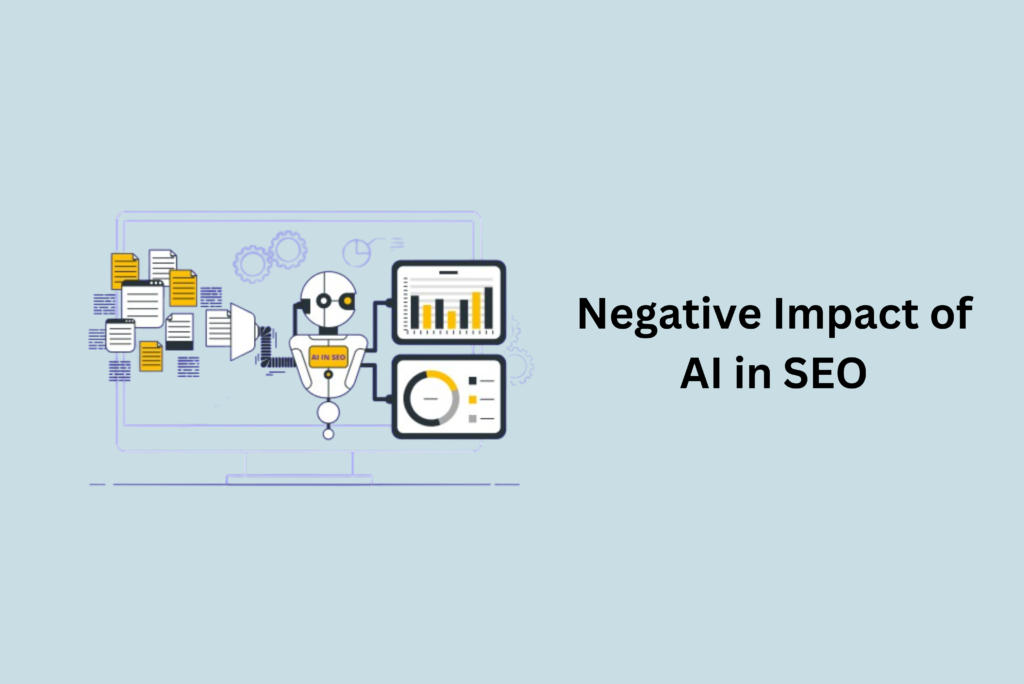
AI can also harm SEO experts, posing risks and challenges to their profession and practice.
Here are some of the possible drawbacks of AI in SEO practices:
6. Overreliance on AI
One of the most common concerns among SEO experts is that they will become overly reliant on AI, losing their creativity and critical thinking skills, both of which are required for SEO.
SEO is not a one-size-fits-all solution; it necessitates ongoing experimentation and adaptation to changing search algorithms and user behavior.
SEO experts must use their own judgment and intuition to create and implement effective SEO strategies, rather than relying solely on AI tools and techniques, which may not always provide the best or most ethical solutions.
SEO experts must use AI as a tool while maintaining their human edge and SEO expertise.
7. Search Engine Algorithm biases
Another issue with AI in SEO is that it can introduce or amplify algorithmic biases, which are the unfair or discriminatory outcomes that arise from the use of AI algorithms. Learning how AI is impacting SEO can help marketers adapt to changing algorithms.
AI algorithms are neither neutral nor objective because they reflect the data and values of their creators and users, which may be incomplete, inaccurate, or biased.
AI algorithms may also have unintended or unexpected consequences that harm the interests and rights of specific groups or individuals.
For example, AI algorithms may favor or penalize specific websites or content based on their language, location, or topic, affecting their ranking and visibility on search engines results.
SEO experts must be aware of the potential algorithmic biases of AI and ensure that their SEO practices are fair and ethical.
The Future of AI and SEO
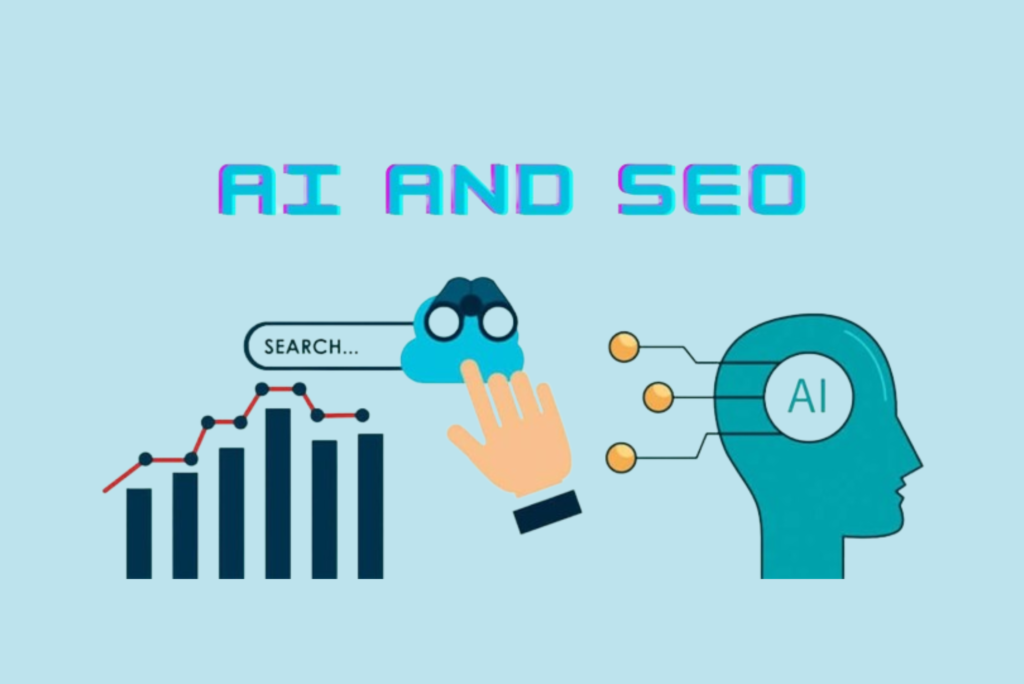
1st Scenario: Understanding the Impact of AI on SEO
The future of SEO and AI is uncertain and unpredictable, as they are constantly evolving and influencing one another. Keeping pace with how AI is impacting SEO requires continuous learning.
Many experts are researching how AI is impacting SEO to predict future trends. However, some potential scenarios and trends can be imagined based on the current state and direction of both fields.
One scenario is that AI will become more dominant and have influential impact on SEO as search engines rely on AI algorithms to rank and display web pages, as well as provide more AI-generated content, such as featured snippets, knowledge graphs, and answer boxes.
SEO experts will need to optimize their websites for these new search paradigms, as well as provide more relevant and valuable content that can compete with or supplement AI-generated content.
2nd Scenario: Understanding the Impact of SEO
Another scenario is that SEO will become more human-centric and personalized, as search engines prioritize user experience and satisfaction while providing more customized and conversational results based on the user’s preferences, behavior, and context.
SEO experts will need to optimize their websites for users rather than search engines, as well as provide more engaging and interactive content that allows users to connect and communicate with them.
It is also critical to use more human skills and techniques to optimise their websites for the user, such as creativity, empathy, and storytelling.
3rd Scenario: SEO And AI
A third scenario is that AI and SEO will come together and integrate as search engines become more transparent and collaborative, providing more data and feedback to SEO experts, and allowing them to influence and shape search results.
SEO experts will be able to use more AI tools and techniques to optimize their websites for search engines and users, as well as provide more data and feedback to search engines, allowing them to learn and improve.
SEO experts and search engines will collaborate to improve and smarten users’ search experiences.
All of these scenarios are hypothetical, and the future of AI and SEO is currently unknown.
Can SEO Be Replaced?
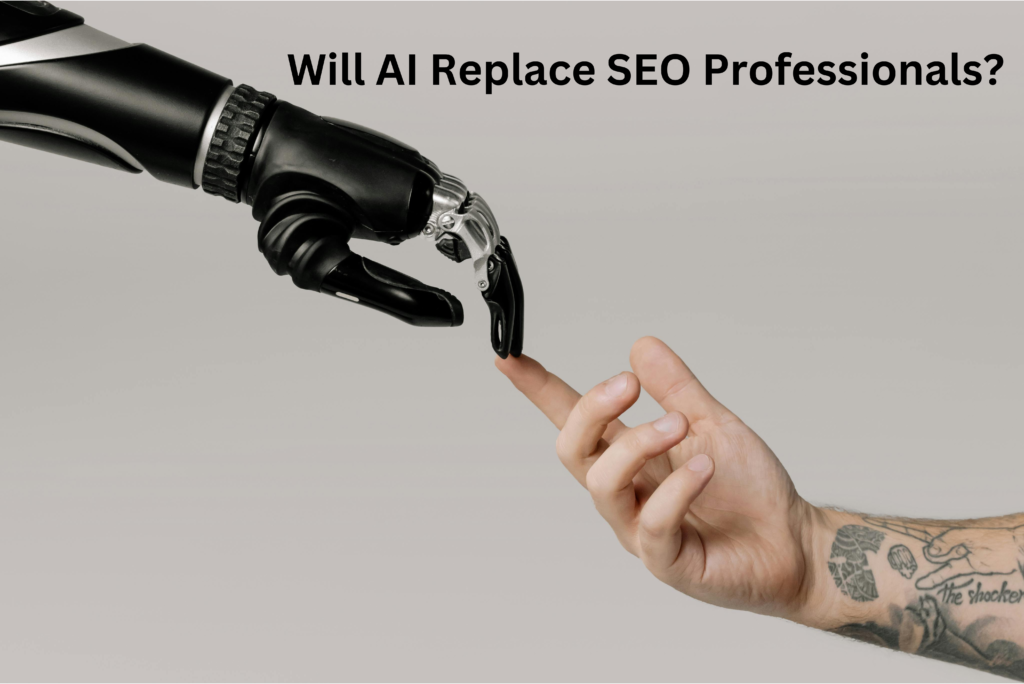
If you are concerned about the future of SEO, rest assured that robots will never replace the human touch. As technology evolves, it’s essential to understand how AI is impacting SEO. Industry leaders are discussing how AI is impacting SEO in online forums and conferences. SEO leaders and content creators’ jobs are safe because these cutting-edge technologies are here to improve the experience rather than replace it. We will see significant advances in AI to better understand the quality of content and links produced.
Related: Link Building Strategies: 15+ Easy Link Building Techniques in SEO for 2024
They assist you in meeting business goals such as conversion and engagement rates. Artificial intelligence is the future of SEO, and it can be used to create a powerful SEO strategy that will get the website noticed. The most significant benefit will be the ability to build a loyal user base.
Finding the Balance: How AI Will Impact SEO
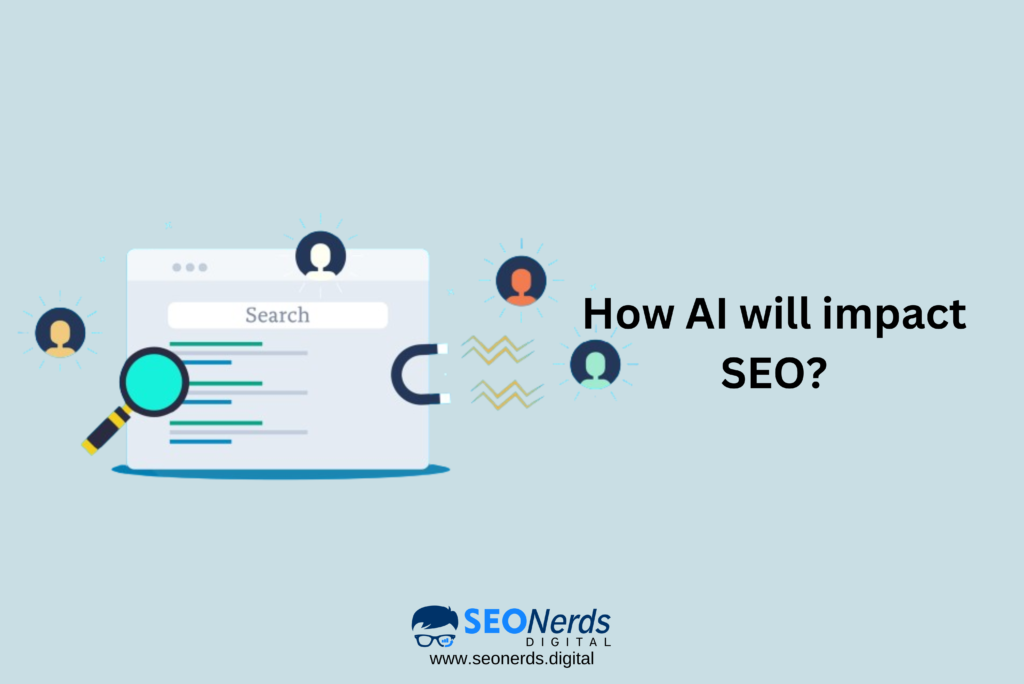
The role of AI in SEO is subtle, with both positive and negative aspects. AI can be either a blessing or a curse for SEO professionals, depending on how they use and adapt to it.
The key to balancing man and machine is understanding their strengths and limitations and leveraging their complementary capabilities.
- AI excels at data-driven, repetitive, and analytical tasks like keyword research, content optimization, and on-page SEO success.
- AI to help SEO experts save time and effort while also improving their SEO performance and efficiency.
- However, AI is not adept at creative, strategic, or contextual tasks such as optimizing their content, SEO planning, and user experience.
- Human experience and creativity cannot be replicated or replaced by AI because humans understand the nuances and emotions of language and behavior.
- SEO professionals must work with AI, not against it, and use it to enhance rather than diminish their skills and value.
Therefore, AI is an opportunity rather than a threat, and it can help us learn and grow.
Conclusion – Role Of AI In SEO
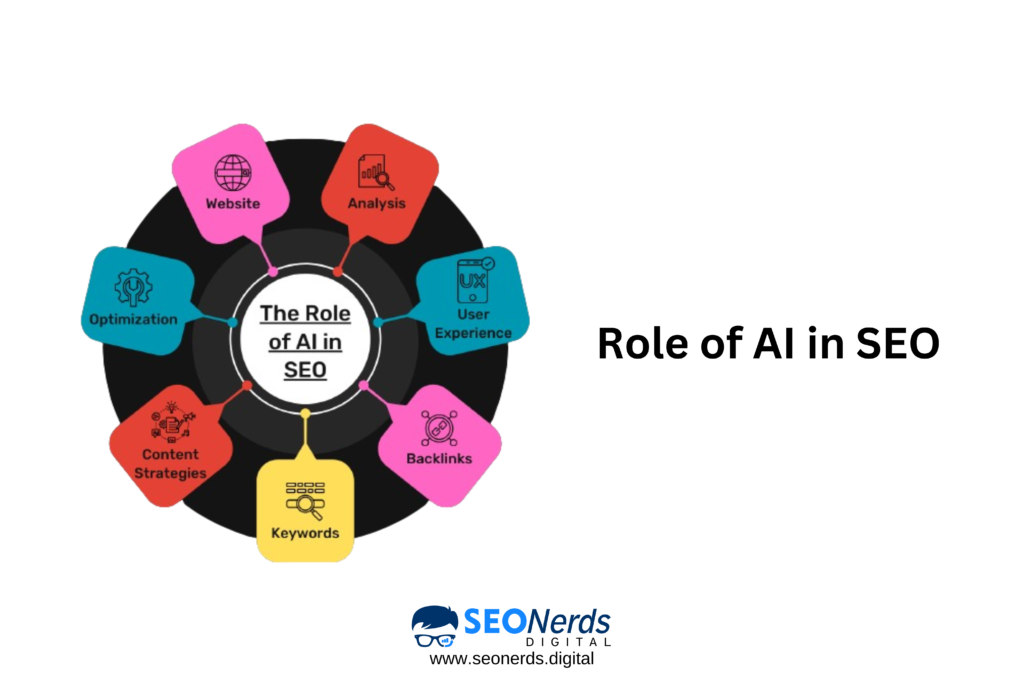
AI is undoubtedly poised to transform the future of SEO. Businesses will benefit from a more accurate, personalized, and efficient SEO landscape, which includes AI-powered search algorithms as well as improved keyword research and content optimization. Adapting to how AI is impacting SEO requires a strategic approach to content optimization. AI advancements also promise to improve user experience, predictive SEO, voice search optimization, and visual search optimization, radically changing the way businesses optimize their online presence.
To stay ahead of the curve, businesses must embrace these changes and adjust their SEO strategies to capitalize on the benefits that AI provides. Businesses can gain a competitive edge by understanding how AI is impacting SEO.
Businesses that harness the power of AI can ensure that they remain competitive in the ever-changing digital landscape while also providing a seamless, engaging experience for their customers. Businesses must adapt to how AI is impacting SEO to maintain online visibility. As time goes on, the integration of AI into SEO will become increasingly important, shaping the future of search and online visibility.
How AI Is Impacting SEO FAQs
Adapting to how AI is impacting SEO is crucial for long-term success.
Q. How AI is affecting SEO?
Ans. AI has the potential to significantly improve SEO performance by assisting content creators and SEO specialists in detecting patterns and opportunities, optimizing content for search engines, and increasing user engagement.
Q. How will generative AI impact the SEO Industry?
Ans. Generative AI has the potential to revolutionize SEO by opening up new avenues for content creation and optimization. Marketers can use generative AI to create unique and engaging articles, blog posts, and product descriptions that are relevant to their target audience.

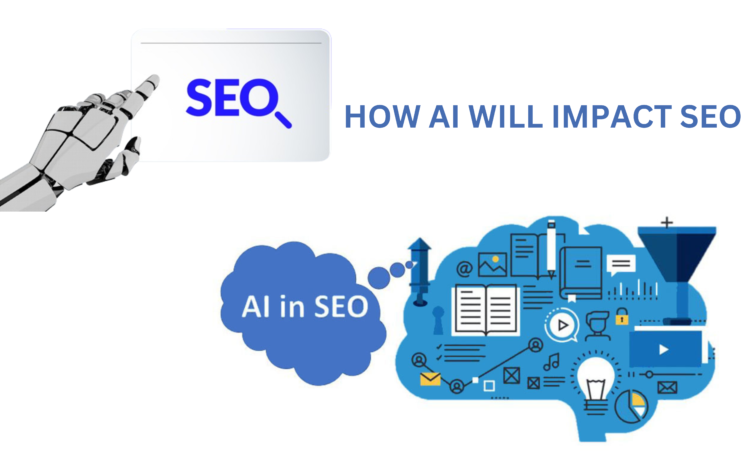









Write a Comment